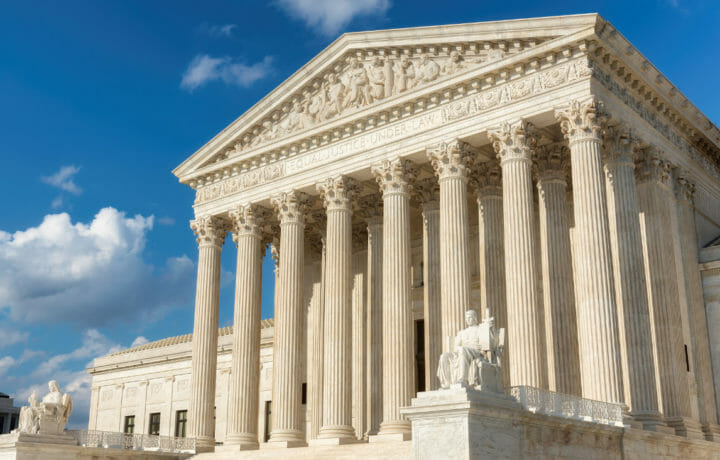The Supreme Court took top-billing in last week’s news cycle, capping an otherwise unremarkable court term with a triple-whammy of major decisions on affirmative action, student loan debt, and the First Amendment.
Apart from these infrequent (albeit significant) blips on the proverbial radar, the Supreme Court is perhaps the least-visible of our three branches of government. This is certainly the case when it comes to security clearance issues.
But visibility and power are not always synonymous. Here are four times from 1959 to 2023 where the Supreme Court has played a significant role in shaping the security clearance as we know it.
Greene v. McElroy, 360 U.S. 474 (1959)
Mr. Greene, an aerospace engineer and government contractor, was accused of associating with communists, visiting with officials at the Russian Embassy, and having Communist literature present in his home. The government relied upon witness testimony to revoke Mr. Greene’s security clearance, but Mr. Greene was not afforded an opportunity to cross examine those witnesses, learn their identity, or even review their testimony against him.
In an important ruling that led to the issuance of Executive Order 10865 (the government’s program for industrial security clearances that remains in effect today), the court held that:
“[C]ertain principles have remained relatively immutable in our jurisprudence. One of these is that, where governmental action seriously injures an individual, and the reasonableness of the action depends on fact findings, the evidence used to prove the Government’s case must be disclosed to the individual so that he has an opportunity to show that it is untrue.”
As it pertained to security clearances, the President or Congress could modify this rule, but that would require an affirmative and explicit action to do so. Rather than take up that invitation, the subsequent Executive Order officially granted most non-intelligence community government contractors the right to confront and cross-examine witnesses against them with rare exception.
Dept. of the Navy v. Egan, 484 U.S. 518 (1988)
Mr. Egan worked as a civil servant at a U.S. Navy facility in Washington state. His security clearance was denied based on criminal history and self-admitted alcohol problems, which led to his termination after he lost an administrative appeal of the security clearance revocation. Mr. Egan appealed his case to the U.S. Merit Systems Protection Board (MSPB). Despite the government’s claims that the MSPB lacked authority, the MSPB hearing officer found that the Board did have authority to hear Mr. Egan’s case, and ordered him reinstated. The full Board reversed, but an Appeals Court sided with the original hearing officer. Ultimately, the Supreme Court held that:
“The grant or denial of security clearance to a particular employee is a sensitive and inherently discretionary judgment call that is committed by law to the appropriate Executive Branch agency having the necessary expertise in protecting classified information. It is not reasonably possible for an outside, nonexpert body [i.e., the MSPB] to review the substance of such a judgment, and such review cannot be presumed merely because the statute does not expressly preclude it.”
Since 1988, lower courts have consistently interpreted this case to mean that they are precluded from second-guessing security clearance decisions made by federal agencies, even if those decisions might be unlawful in other contexts. In the eyes of some critics, including this writer, the near-total deference given to federal agencies on security clearances has created a legal “wild west” ripe for abuse. Unfortunately, the Supreme Court has declined to revisit this holding as recently as earlier this year.
Webster v. Doe, 486 U.S. 592 (1988)
John Doe was a CIA employee fired after he “voluntarily informed a CIA security officer that he was a homosexual.” Mr. Doe sued under various legal theories and found a receptive audience on some of them at the Supreme Court. Decided just months after the Egan case that seemed to foreclose any judicial review of security clearance determinations, Doe appears to have created an exception authorizing judicial review of security clearance denials or revocations in cases of “colorable constitutional claims.”
Incredibly, nearly 40 years later, this issue of “colorable constitutional claims” is still being litigated. Lower courts have managed to dodge thorny issues like how blatant constitutional violations must be before they become “colorable,” and some of the best test cases have resulted in settlements by the government in order to avoid unfavorable rulings. The result is that this is still an unsettled area of law, and one which the Supreme Court may eventually be forced to confront.
Mowery v. Nat’l Geospatial Intel. Agency, U.S., No. 22-560, cert. (Denied Feb. 21, 2023)
Most recently, the Supreme Court denied an invitation by intelligence community contractor Nathan Mowery to revisit the Egan holding. Mr. Mowery alleged that he was denied a detailee assignment by the CIA due to his Muslim faith. The record evidence in the case appeared to support his claims; he was rejected without explanation following a psychological evaluation in which he was asked extensively about his faith, a topic that other examinees attested was not addressed during their examinations. However, the agency did not deny Mowery a security clearance, instead simply declining to move forward with the clearance process. Mowery argued that lower courts were reading Egan too broadly and applying it in other national security employment contexts, leaving employees without any legal recourse to challenge unlawful agency actions. However, the Supreme Court declined to accept the case, once again cementing Egan – and near-total deference to the executive branch on security clearances and national security employment vetting generally – as the law.
This article is intended as general information only and should not be construed as legal advice. Although the information is believed to be accurate as of the publication date, no guarantee or warranty is offered or implied. Laws and government policies are subject to change, and the information provided herein may not provide a complete or current analysis of the topic or other pertinent considerations. Consult an attorney regarding your specific situation.




